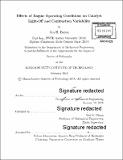Effects of engine operating conditions on catalyst light-off and combustion variability
Author(s)
Baron, Jan H
DownloadFull printable version (22.83Mb)
Other Contributors
Massachusetts Institute of Technology. Department of Mechanical Engineering.
Advisor
Wai K. Cheng.
Terms of use
Metadata
Show full item recordAbstract
Greenhouse gas targets for passenger car internal combustion engines as well as increasingly stringent emissions legislation around the globe require innovative development approaches for future engine generations. At the same time, trade-offs can limit important design parameters necessitating fundamental understanding of the parameters involved. Toxic tail pipe emissions of gasoline engines are often associated with the efficiency of three-way catalytic converters and the time they take to reach light-off temperature, since a well-functioning converter reduces the tail pipe emissions by up to 99 %. Previous research suggests that exhaust gas back pressure could potentially improve converter light-off, though a thorough understanding is absent. With an experimental approach, the influence of back pressure on the converter reaction kinetics was investigated with a custom-built flow bench. Subsequently, the light-off characteristic of the converter with back pressure was investigated, with a typical downsized, turbocharged four-cylinder GDI engine used to incorporate physical effects from engine operation. Based on these experimental results a converter light-off model was developed that accurately simulates converter light-off with back pressure. Fuel consumption or greenhouse gas emissions are largely influenced by an engine's thermodynamic efficiency and its knock tendency for optimum combustion phasing. Cycle-to-cycle variation (CCV) of the combustion can potentially reduce the efficiency significantly. An experimental approach was used to derive a fundamental understanding of CCV for non-knocking combustion. A simple geometric interpretation of combustion CCV was developed by parameterization of the heat release schedule. With the developed metric, the influence of charge motion, mixture quality, and residual gas fraction on combustion CCV was quantified. Thereafter, the impact of CCV on knocking combustion was investigated. A dominant CCV being the so called hot spot, its influence on CCV of knock was simulated and quantified with experiments. Furthermore, it was shown that the knock tendency of the engine was improved substantially by strongly increased tumble charge motion for direct-injection, even though the overall influence of the hot spot on the CCV of knock was similar. The improved knock tendency led to efficiency gains of approximately three percent.
Description
Thesis: Ph. D., Massachusetts Institute of Technology, Department of Mechanical Engineering, 2018. Cataloged from PDF version of thesis. Includes bibliographical references (pages 149-155).
Date issued
2018Department
Massachusetts Institute of Technology. Department of Mechanical EngineeringPublisher
Massachusetts Institute of Technology
Keywords
Mechanical Engineering.